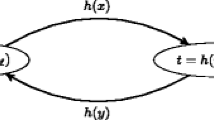Abstract
Locally finite omega languages were introduced by Ressayre [Formal languages defined by the underlying structure of their words. J Symb Log 53(4):1009–1026, 1988]. These languages are defined by local sentences and extend ω-languages accepted by Büchi automata or defined by monadic second order sentences. We investigate their topological complexity. All locally finite ω-languages are analytic sets, the class LOC ω of locally finite ω-languages meets all finite levels of the Borel hierarchy and there exist some locally finite ω-languages which are Borel sets of infinite rank or even analytic but non-Borel sets. This gives partial answers to questions of Simonnet (Automates et Théorie Descriptive, Ph.D. Thesis. Université Paris 7, March 1992) and of Duparc et al. [Computer science and the fine structure of Borel sets. Theor Comput Sci 257(1–2):85–105, 2001].
Similar content being viewed by others
References
Börger E., Grädel E., Gurevich Y.: The Classical Decision Problem. Springer, Heidelberg (1997)
Büchi J.R., Landweber L.H.: Solving sequential conditions by finite state strategies. Trans. Am. Math. Soc. 138, 295–311 (1969)
Büchi J.R.: Weak second order arithmetic and finite automata. Zeitschrift fur Mathematische Logik und Grundlagen der Mathematik 6, 66–92 (1960)
Büchi, J.R.: On a decision method in restricted second order arithmetic, logic methodology and philosophy of science. In: Proceedings of the 1960 International Congress. Stanford University Press, pp. 1–11 (1962)
Büchi J.R., Siefkes D.: The monadic second order theory of all countable ordinals, decidable theories 2. Lect. Notes Math. 328, 1–217 (1973)
Chang, C.C., Keisler, H.J.: Model Theory, American Elsevier Publishing Company, Inc., New York (1973) (3rd edn., North Holland, Amsterdam, 1990)
Duparc, J.: La Forme Normale des Boréliens de Rang Fini. Ph.D. Thesis, Université Paris 7 (1995)
Duparc, J.: The Normal Form of Borel Sets, Part 1: Borel Sets of Finite Rank. Comptes Rendus de l’Académie des Sciences, Paris, t.320, Série 1, pp. 651–656 (1995)
Duparc J.: Wadge hierarchy and Veblen hierarchy: Part 1: Borel sets of finite rank. J. Symb. Log. 66(1), 56–86 (2001)
Duparc J., Finkel O., Ressayre J-P.: Computer science and the fine structure of Borel sets. Theor. Comput. Sci. 257(1–2), 85–105 (2001)
Engelfriet J., Hoogeboom H.J.: X-automata on ω-words. Theor. Comput. Sci. 110(1), 1–51 (1993)
Finkel, O.: Langages de Büchi et ω-Langages Locaux. Comptes Rendus de l’Académie des Sciences, Paris, t.309, Série 1, pp. 991–994 (1989)
Finkel, O.: Théorie des Modèles des Formules Locales et Etude des Langages Formels qu’elles Définissent. Ph.D. Thesis, Université Paris 7 (1993)
Finkel O., Ressayre J-P.: Stretchings. J. Symb. Log. 61(2), 563–585 (1996)
Finkel O.: Locally finite languages. Theor. Comput. Sci. 255(1–2), 223–261 (2001)
Finkel O.: Topological properties of omega context free languages. Theor. Comput. Sci. 262(1–2), 669–697 (2001)
Finkel, O.: Locally Finite ω-Languages and Borel Sets of Infinite Rank (preprint)
Finkel O.: Closure properties of locally finite omega languages. Theor. Comput. Sci. 322(1), 69–84 (2004)
Finkel, O.: On decidability properties of local sentences. In: Proceedings of the 11th Workshop on Logic, Language, Information and Computation WoLLIC 2004. Electronic Notes in Theoretical Computer Science, vol. 123, pp. 75–92. Elsevier, Amsterdam (2005)
Finkel O.: On decidability properties of local sentences. Theor. Comput. Sci. 364(2), 196–211 (2006)
Hopcroft, J.E., Ullman, J.D.: Formal Languages and their Relation to Automata. Addison-Wesley Publishing Company, Reading (1969)
Kechris A.S.: Classical Descriptive Set Theory. Springer, Heidelberg (1995)
Kuratowski K.: Topology. Academic Press, New York (1966)
Kechris A.S., Marker D., Sami R.L.: \({\Pi_1^1}\) Borel sets. J. Symb. Log. 54(3), 915–920 (1989)
Landweber L.H.: Decision problems for ω-automata. Math. Syst. Theory 3(4), 376–384 (1969)
Lescow, H., Thomas, W.: Logical specifications of infinite computations. In: A Decade of Concurrency. de Bakker, J.W., et al. (eds.) Lecture Notes in Computer Science, vol. 803, pp. 583–621. Springer, Heidelberg (1994)
Meyer, A.R.: Weak monadic second order theory of successor is not elementary recursive, logic colloquium (Boston, Mass., 1972–1973). Lecture Notes in Mathematics, vol. 453, pp. 132–154. Springer, Berlin (1975)
Moschovakis Y.N.: Descriptive Set Theory. North-Holland, Amsterdam (1980)
Parigot M., Pelz E.: A logical approach to Petri net languages. Theor. Comput. Sci. 39, 155–169 (1985)
Perrin D., Pin J.-E.: Infinite words, automata, semigroups, logic and games. Pure and Applied Mathematics, vol. 141 . Elsevier, Amsterdam (2004)
Pin J-E.: Logic, semigroups and automata on words. Ann. Math. Artif. Intell. 16, 343–384 (1996)
Ressayre J-P.: Formal languages defined by the underlying structure of their words. J. Symb. Log. 53(4), 1009–1026 (1988)
Rogers H.: Theory of Recursive Functions and Effective Computability. McGraw-Hill, New York (1967)
Safra, S.: Complexity of Automata on Infinite Objects. Ph.D. Thesis, Weizmann Institute of Science, Rehovot, Israel (1989)
Shoenfield J.R.: Mathematical Logic. Addison-Wesley, Reading (1967)
Simonnet, P.: Automates et Théorie Descriptive. Ph.D. Thesis, Université Paris 7, March (1992)
Simonnet, P.: Automate d’Arbres Infinis et Choix Borélien. Comptes Rendus de l’Académie des Sciences, Paris, t.316, Série 1, pp. 97–100, (1993)
Staiger L. (1997) ω-Languages. In: Rozenberg, G., Salomaa, A. (eds.) Handbook of Formal Languages, vol 3, pp. 339–388. Springer, Berlin (1997)
Thomas W.: Automata on Infinite Objects. In: Van Leeuwen, J.(eds) Handbook of Theoretical Computer Science vol. B, pp. 133–191. Elsevier, Amsterdam (1990)
Thomas W.: Languages, automata and logic. In: Rozenberg, G., Salomaa, A.(eds) Handbook of Formal Languages, vol. 3., pp. 389–456. Springer, Heidelberg (1997)
Wadge, W.W.: Reducibility and determinateness on the Baire space. Ph.D. Thesis, Berkeley (1983)
Wagner K.: On omega regular sets. Inf. Control 43, 123–177 (1979)
Author information
Authors and Affiliations
Corresponding author
Rights and permissions
About this article
Cite this article
Finkel, O. Topological complexity of locally finite ω-languages. Arch. Math. Logic 47, 625–651 (2008). https://doi.org/10.1007/s00153-008-0101-7
Received:
Published:
Issue Date:
DOI: https://doi.org/10.1007/s00153-008-0101-7




